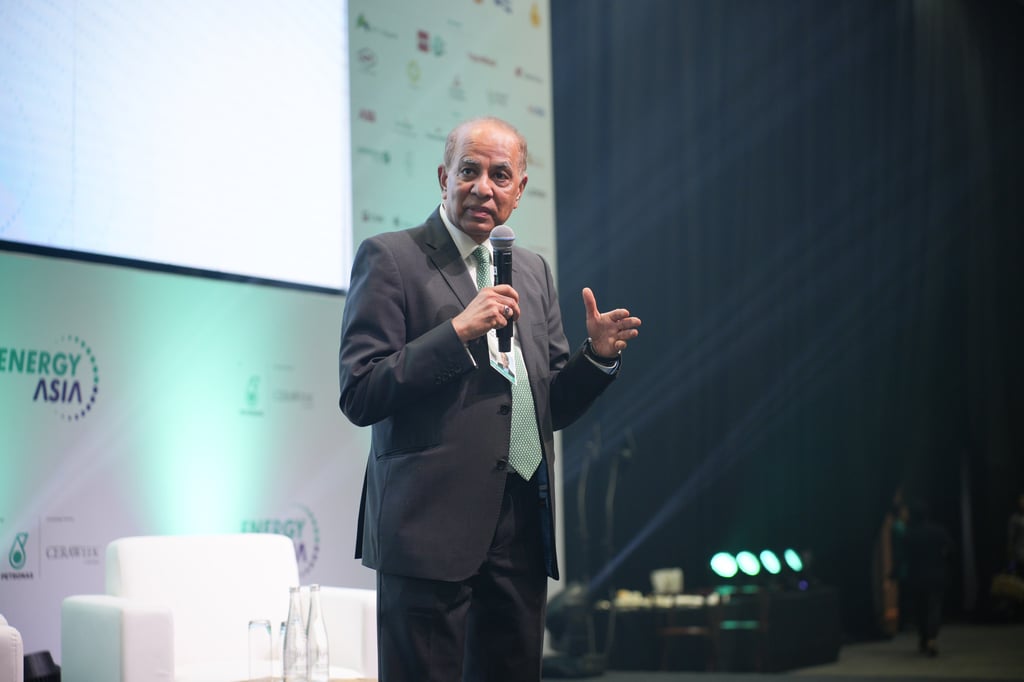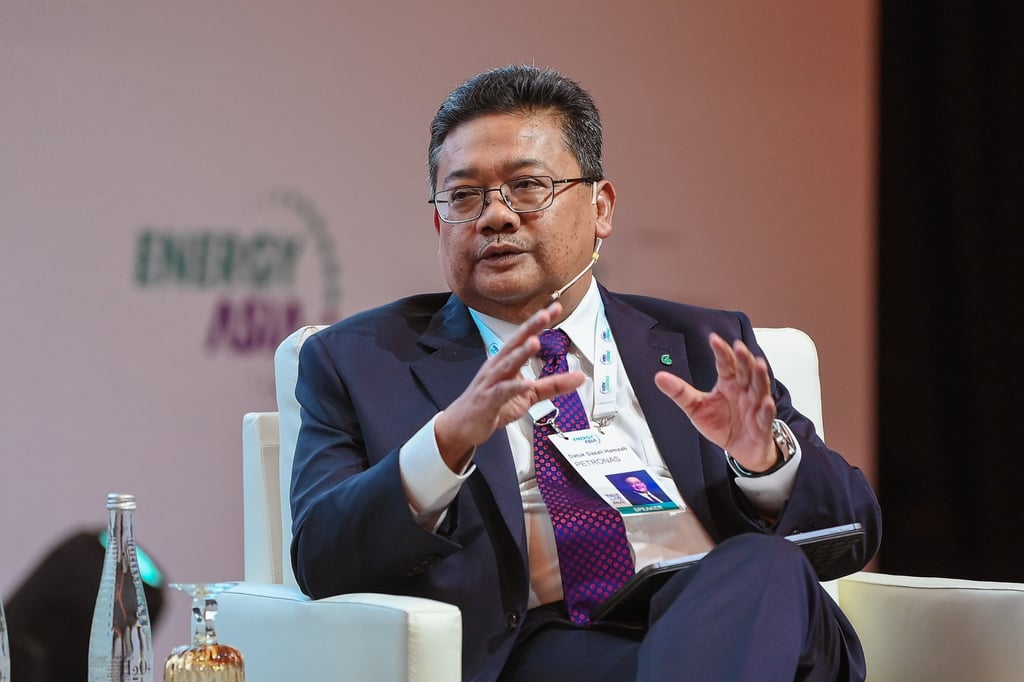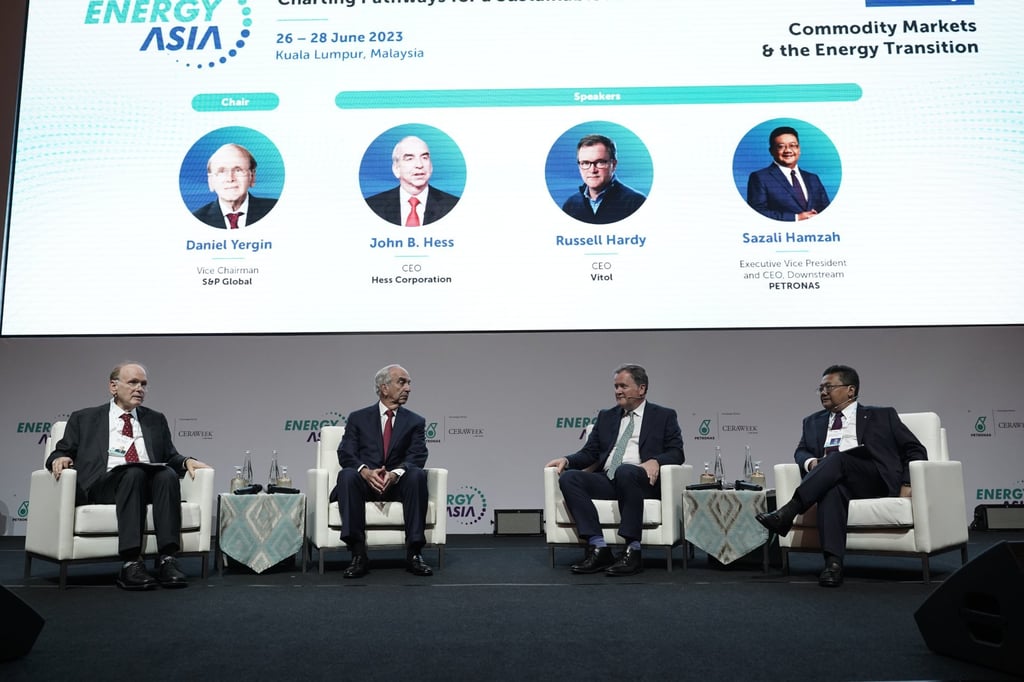International cooperation is Asia’s best shot at achieving its net-zero carbon emissions goal, as shown by the Energy Asia conference
- The inaugural conference set the stage for strategic discussions, notes Datuk Sazali Hamzah, executive vice-president and CEO of the downstream business for Petronas
- Asian countries must collaborate more on policies and solutions, says Dr Atul Arya, senior vice-president and chief energy strategist at S&P Global Commodity Insights

[Sponsored article]
More than 70 governments have pledged to achieve net-zero carbon emissions by 2050, and that coalition is growing, according to the World Economic Forum. While this indicates serious investment and commitment to the global energy transition, the United Nations has reported that the current set of national climate action plans is falling short. The blunt truth is that, collectively, the world is not yet on track to meet the desired targets.
“Getting to net zero requires all governments – first and foremost, the biggest emitters – to significantly strengthen their Nationally Determined Contributions and take bold, immediate steps towards reducing emissions now,” the UN said, referring to the emissions reduction targets that countries are obligated to submit under the Paris Agreement.
Contributions by Asian countries can make a huge impact, too. The International Energy Agency’s “Southeast Asia Energy Outlook 2022” report found that an accelerated transition to sustainable energy across the region would not only cut carbon dioxide emissions and fossil fuel imports, but also speed up universal access to electricity and clean cooking for the population. In addition, it would provide greater business opportunities within the emerging clean energy economy.
“Asia is going to be the growth engine for energy demand for decades to come,” said Dr Atul Arya, senior vice-president and chief energy strategist at S&P Global Commodity Insights. “That’s where the population is growing. That’s where the economies are growing.”

Arya went on to emphasise the importance of cooperation among various stakeholders in the energy sector. “What we learned working with Petronas and holding three multi-stakeholder dialogues in recent months – which [saw participation] by government officials, companies, NGOs and technology universities – is the importance of collaboration,” he said. “Asian countries need to work together much more than they have been able to do, whether it’s collaboration on technology or policy on financing.”
Datuk Sazali Hamzah, executive vice-president and CEO of the downstream business for the Malaysian energy group Petronas, agreed with this point, saying: “At Petronas, we advocate for companies to partner with one another, and for concrete policies to be shaped out of constructive exchange, because we all share the same aspiration: a low-carbon future. We can harness the power of synergy by combining our collective knowledge, resources and expertise.”
International gatherings present opportunities
In order for successful partnerships to happen, opportunities need to be created for facilitating strategic dialogues and expediting synergies between sectors. These opportunities can be found at global forums and international gatherings like the Abu Dhabi International Petroleum Exhibition Conference and the UN’s annual Climate Change Conference (also known as COP), both of which enable the energy sector to tackle complex topics across the value chain with cross-sector partners.
In March, the 2023 edition of S&P Global’s annual CERAWeek conference was held in Houston, Texas, bringing together global leaders from various sectors to explore new ideas, insights and solutions regarding the biggest challenges for the future of energy, the environment and the climate.

More recently, the inaugural Energy Asia conference took place in Malaysia, hosted by Petronas with the aim of providing a platform for business leaders and government officials to explore and discuss solutions for the region’s shared net-zero goal. The three-day conference was held in June in Kuala Lumpur, with more than 4,600 participants from 28 countries attending, and featuring more than 100 speakers and 46 sponsors representing 19 industries.
“Energy Asia was a great opportunity to bring together important participants in that growth story – both from within Asia and around the world – and showcase what Asia can do, but also discuss what Asia needs,” Arya said. “I see Energy Asia as a meeting point to think about, discuss and debate the future direction of energy, and also climate change.”
Sazali added: “The event presented collaboration opportunities among industry players as well as policymakers to create impactful and lasting change towards energy transition – one that creates social value and enables progress for society as a whole.”
Energy transition calls for collaboration
The consensus from Energy Asia is clear: while the region’s energy transition will be complicated, it must be achieved, and it calls for collaborative efforts to find actionable solutions.
As one example of such collaboration, Sazali cited Petronas’ partnership with Eni, an Italian energy company, and Euglena, a Japanese biotechnology company that researches, develops and produces microalgae. “Leveraging each other’s capabilities, we have planned to develop a biorefinery in the Pengerang Integrated Complex [PIC] that will provide us the capability to capture opportunities in the global biofuel space,” he said. PIC is Petronas’ refinery and petrochemical hub in Malaysia.

“It is expected to be able to produce up to 12,500 barrels per day of biofuels – mainly sustainable aviation fuel [SAF] and hydrogenated vegetable oil [HVO],” Sazali added. “[This partnership] allows us to tap into each other’s strengths and networks, thereby streamlining our entry into biofuel markets in the Asia-Pacific and Europe.”
He continued: “Our partner, Euglena, has established biotechnology to mass-cultivate a microalgae, also called euglena, which can be used as an alternative feedstock. They are currently conducting research to improve the cultivation, in order to achieve better economies of scale. Eni, on the other hand, has experience in converting and operating their refinery into a biorefinery.”
Collaboration is also a priority at S&P Global, as demonstrated by its role as a knowledge partner for Energy Asia. Arya said of the financial analytics company: “We bring a lot of capabilities – we have expertise in energy, transportation and climate change sustainability. And so we use that knowledge to help Petronas shape the programme for Energy Asia, and also help bring the right kind of people and create an outcome-oriented event.”
This kind of cooperation will only grow as the region takes on the challenge of reaching net-zero emissions, according to Sazali. “By drawing on our expertise and the reach of a global energy player, we can add value to partnerships to accelerate a transition towards a low-carbon future, specifically in the region,” he explained.
Sazali added: “It’s not just about reducing emissions – it’s also about meeting tomorrow’s energy needs by making cleaner energy solutions more accessible and affordable to the world.”